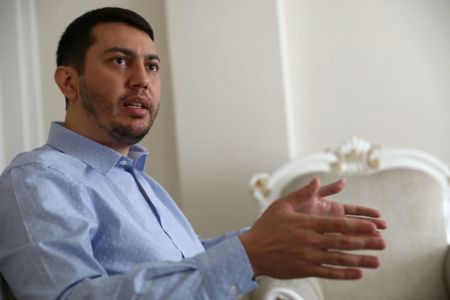NASA scientist detained in Turkey for 4 years returns home

A NASA scientist who was imprisoned and detained on house arrest for over four years in Turkey has returned to the United States with his family.
Serkan Golge, who was sentenced to seven-and-a-half years in prison on trumped-up terrorism charges in a verdict condemned by the U.S. government, arrived in Washington, D.C., on a commercial flight early Tuesday morning, according to The New York Times.
Golge’s return comes almost eight months after President Donald Trump announced at a press briefing with Turkey's President Recep Tayyip Erdogan at the White House that Golge had been released and would be home soon. However, Golge remained under judicial control for months thereafter, and his family was barred from leaving Turkey.
The judicial controls were lifted in April, but it wasn’t until recently that international flights resumed following the disruption caused by the coronavirus pandemic.
Golge, a 40-year-old naturalized U.S. citizen who served as a contractor on a proposed mission to Mars and lived near Houston, Texas, was among many Americans imprisoned by Turkish authorities that U.S. officials believe were held captive for political reasons in the wake of the 2016 coup attempt against the Erdogan government.
Another one of those hostages, North Carolina missionary Andrew Brunson, spent over two years in a Turkish prison and house arrest on similar charges before his return to the U.S. in 2018. Brunson’s imprisonment inspired an international prayer and awareness effort that drew the attention of U.S. evangelicals and Trump.
At the height of the international advocacy effort for Brunson, activists called for Golge’s case not to be lost in the equation.
The imprisonment of Americans had sewn division between the U.S. and Turkey, NATO allies, leading the Trump administration to place sanctions on Turkey. Last November, after a meeting at the White House, Trump thanked Erdogan for releasing Golge and declared that he would “be coming back at some point in the not-too-distant future.”
According to an earlier New York Times report, at least 20 U.S. citizens have been imprisoned or prevented from leaving Turkey in the wake of the 2016 coup attempt. Additionally, over 100,000 people have been detained, many on Trumped-up charges of being affiliated with a movement blamed for masterminding the coup attempt.
Golge was arrested in July 2016 while visiting his family in Southern Turkey. Like Brunson, Golge was accused of being involved in the Gulen movement, a movement named after U.S.-based Muslim cleric Fethullah Gulen.
Many have surmised that the American prisoners served as a ransom to pressure the U.S. to extradite Gulen.
Although Golge and his family have returned to the U.S., all of whom are U.S. citizens, the NY Times reports that Golge’s case is still pending a final appeal at Turkey’s Supreme Court.
Brunson, who served as a missionary in Turkey for over two decades before his arrest, raised an alarm last year during a hearing before the U.S. Commission on International Religious Freedom in Washington, D.C., about an increase in deportations of foreign pastors and their families from Turkey. He warned that most pastors being deported in the wake of the coup attempt are leaders in their respective churches.
Bruson explained that with Christians being a small minority in Muslim-majority Turkey, Turkish churches rely on foreign leadership. He said the Turkish government doesn't allow Christians to set up training programs to develop leaders in the country.
Deutsche Welle reported last weekend that Protestant pastors and their families in Turkey are living under increased fear of deportation as some Christians are being deemed threats to national security.
Timur Topuz, the president of the Istanbul Protestant Church Foundation, told the German news outlet that Protestant pastors are facing growing hostility.
"Since the Brunson incident, all Protestant pastors are treated with suspicion," Topuz explained. "Thirty-five pastors of the Turkish-Protestant community are experiencing problems of this kind.”
With family members included, Topuz said that as many as 100 members of his Protestant community are facing difficulties with immigration issues like visa renewals. One example, Topuz said, is Pastor Carlos Madrigal from Spain who has led his church for 19 years without any problems getting his residence status renewed until recently.
Follow Samuel Smith on Twitter: @IamSamSmith, or Facebook: SamuelSmithCP.





















